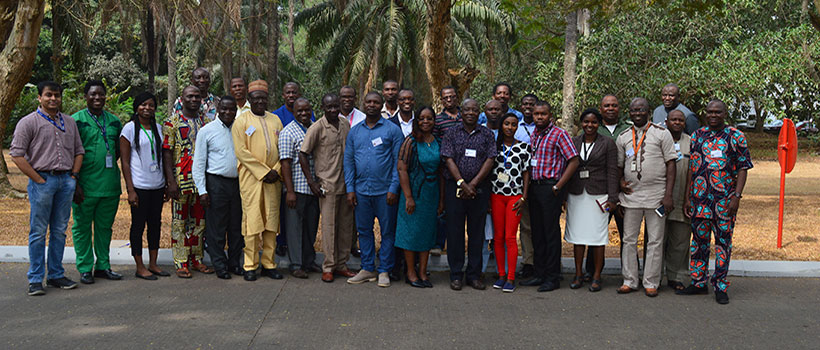
Building regional capacity to contain Banana Bunchy Top Disease (BBTD) spread in West Africa

Participants of the BBTD workshop at IITA.
A training workshop on “Banana Bunchy Top Disease (BBTD) diagnosis, surveillance and emergency response” was held 14 to 16 January 2019 at IITA, Ibadan, Nigeria. The workshop, sponsored by the CGIAR Research Program on Roots, Tubers and Bananas (CRP-RTB), was attended by 20 participants from Togo – Direction de la Protection des Végétaux (DPV), Institut de Conseil et d’Appui Technique (ICAT), and Université de Kara; Ghana – Plant Protection and Regulatory Services Directorate (PPRSD)]; and Nigeria – Nigerian Agricultural Quarantine Services (NAQS), National Horticultural Research Institute (NIHORT), the National Agricultural Seed Council (NASC), and ECOWAS.
The purpose of the workshop was to strengthen national capacity in disease surveillance and diagnosis and implement an emergency response to eliminate infected plants. The course offered hands-on training in the application of on-field diagnostics for the detection of BBTV using methods such as LAMP (Loop-mediated Isothermal Amplification) and RPA (Recombinase Polymerase Amplification) and using the Crop Disease Surveillance (CDS) mobile app for real-time surveillance and reporting.
BBTD is a devastating viral disease of plantain and banana caused by BBTV transmitted by the banana aphid (Pentalonia nigronervosa). “BBTD outbreak in West Africa was first recognized in 2010 in Benin and 2011 in Nigeria,” said Lava Kumar, IITA virologist and Head of IITA’s Germplasm Health Unit, and organizer of the workshop. Various actions by the national programs and IITA have resulted in preventing disease expansion in these countries, he added. In September 2018, BBTV was detected for the first time in Togo, and the emergency response action implemented jointly by DPV-Togo and IITA had resulted in eradicating the disease detected in three locations in the country. “Inadvertent distribution of BBTV-infected planting material has led to widespread occurrence of the virus in sub-Saharan Africa and the same factor may have led to the virus introduction in Togo,” said Kumar.
During the country presentations, Mr John Obaje, Director of Plant Quarantine, NAQS presented surveillance and eradication activities to contain the disease in Nigeria, while Sunday Akinyemi, Director of Research at NIHORT gave an update on banana production recovery using virus-free planting materials in the affected regions of Ogun State, Nigeria. Akinyemi emphasized the importance of providing farmers with incentives during the recovery period to encourage participation in the control measures.
Adam Iddrisu Alidu, Head of Pathology, PPRSD Ghana; Ayaba Sanvee of DPV Togo, and Atti Tchabi of University of Kara, Togo, expounded on existing frameworks for containing regulated quarantine pests such as BBTD, and needs for implementing effective survillence.
Benoit Gnonlonfin, Sanitary and Phytosanitary (SPS) Standards Adviser of the ECOWAS Commission, presented on the regional SPS framework for prevention, containment, and control of emerging diseases. He stated that implementation of SPS procedures was poor due to limited funding, weak technical capacities, and poor communication and coordination among the stakeholders. Gnonlonfin further emphasized that technologies, procedures, protocols, and experiences from Nigeria will come handy in tackling BBTD in the subregion and urged participants to work together to contain the emerging threat on banana and plantain in the subregion. Particpants developed a BBTD containment plan based on ECOWAS SPS framework for prevention, preparedness, emergency response, recovery, and and coordination.
Training on the BBTD surveillance and diagnosis was carried throughout the workshop. A visit to IITA banana fields was organized and the participants were trained on the use of the CDS and data submission by Busayo Ogunya of the IT Unit. The CDS app usable on Android phones allows users to rapidly diagnose and communicate about diseases from the field. In the laboratory, participants were trained on DNA extraction and the use of new tools, LAMP, and RPA, for the detection of BBTV in field condition by Adedamola Oresanya of the Virology Unit. He highlighted the pros and cons of both methods for disease diagnosis. Methods to eradicate BBTV infected plants was organized by Yao Colombia and Taiwo Oviasuyi of Virology Unit. At the end of the workshop, participants lauded efforts of IITA and appreciated RTB, for sponsoring this workshop.
